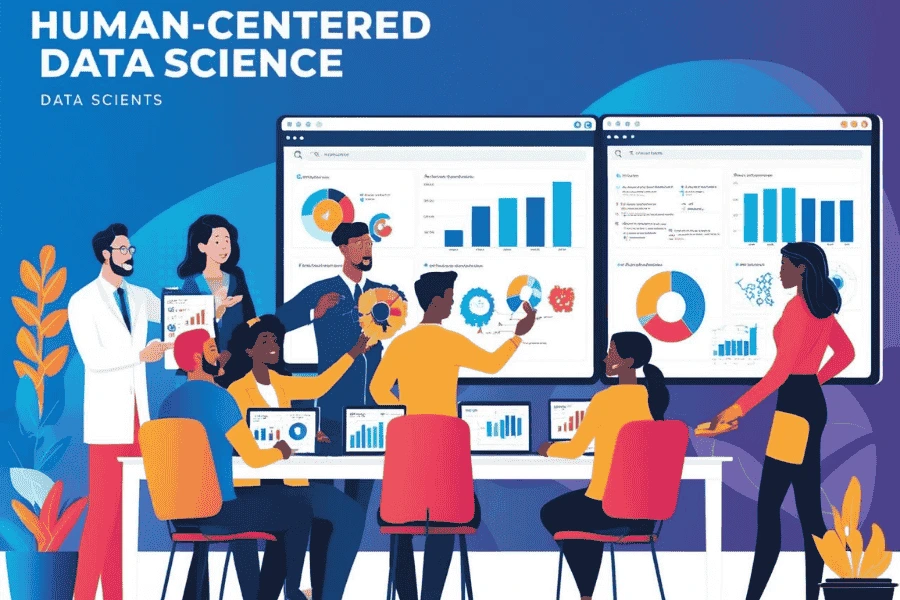The Human-Centered Data Science: Balancing Quantitative Insight with Social Context
Introduction
In a world that is increasingly driven by data, data science plays a crucial role in solving diverse challenges, from predicting health trends to enhancing user experiences in digital platforms. However, while data science is a powerful tool, it can miss the mark when it fails to incorporate the social context surrounding the data. This is especially true when data science models are developed in isolation, without considering the social, cultural, and ethical implications of the data. When we overlook these factors, we risk amplifying biases and reinforcing inequality.
This is where human-centered data science (HCDS) comes into play. Unlike traditional data science, which focuses primarily on technical performance, human-centered data science places people at the heart of the process. It emphasizes the importance of understanding how data impacts individuals and communities, ensuring that data-driven solutions are not only effective but also fair, inclusive, and just.

What is Human-Centered Data Science?
Human-centered data science is an approach that shifts focus from raw numbers to human beings and their experiences. It integrates ethical considerations into the data science process, ensuring that the tools and models created are aligned with the well-being of all stakeholders involved. Key components of this approach include:
- Contextual Awareness: This involves understanding the broader social, historical, and cultural factors that influence the data. By recognizing these influences, data scientists can avoid oversimplifying complex social issues.
- Participatory Design: In human-centered data science, it’s important to involve people especially from marginalized communities in the creation and application of data models. This ensures that the solutions designed meet the needs of the people they are intended to serve.
- Transparency in Machine Learning: Models must be interpretable and understandable, allowing users to question, audit, and challenge the decisions made by algorithms. This promotes accountability and reduces the potential for harm.
- Ethical Reflexivity: Practitioners of human-centered data science continuously reflect on the ethical implications of their work, questioning how their models affect people’s lives and ensuring fairness in outcomes.
Applications of Human-Centered Data Science
The principles of human-centered data science are not just theoretical but are actively applied across various sectors. In healthcare, for instance, patient data is analyzed with a deep understanding of social determinants of health, such as income, education, and access to healthcare, allowing for the identification and reduction of health disparities. In the field of education, data models are designed to consider factors like socioeconomic status, linguistic diversity, and learning styles, ensuring that the needs of all students are met and avoiding the reinforcement of existing gaps. In the realm of social media, content moderation algorithms are being refined to understand the nuances of cultural context and social dynamics, making these systems more fair and preventing discrimination or bias. Additionally, with the growing presence of Artificial Intelligence (AI), it is essential to ensure that AI systems are developed in accordance with ethical guidelines. Human-centered data science advocates for the creation of AI systems that are both fair and inclusive, ensuring that their benefits extend to all individuals.
The Importance of Social Impact in Data Science
As data science continues to shape our world, its role in shaping society becomes more pronounced. Data-driven decisions are increasingly influencing critical areas such as healthcare, employment, and law enforcement. Without considering the social impact of these decisions, we risk reinforcing existing biases and social inequalities.
A human-centered approach ensures that data science serves the common good by prioritizing justice, equality, and accountability. In this way, data science can be a force for good, working to create a world that is fairer and more inclusive.
Building a Collaborative, Interdisciplinary Approach
Implementing human-centered data science requires collaboration across multiple disciplines. A successful data science project should bring together experts not only in data science but also in fields like sociology, ethics, and community engagement. This interdisciplinary approach ensures that data models reflect the diverse perspectives and needs of the communities they impact.
Educational institutions must also prioritize teaching future data scientists about the importance of critical thinking, ethics, and social responsibility alongside technical expertise. By training data professionals to be more than just technical experts, we can create a new generation of data scientists who are capable of making responsible and ethical decisions
Conclusion
The future data science depends on asking the right questions, not just building more sophisticated models. By grounding data science in a social context, we ensure that the solutions we create are not only efficient but also fair, inclusive, and just. Human-centered data science is about placing people at the core of the data analysis process, ensuring that every decision made by algorithms and models serves to improve the lives of individuals and communities.
Ultimately, human-centered data science is not just a technical discipline, it is a way of thinking about how we can use data to build a better world, where every person’s rights are respected, and their dignity is upheld.
Active Events
Transition from Non-Data Science to Data Science Roles
Date: Aug 07, 2025 | 7:00 PM (IST)
7:00 PM (IST) - 8:10 PM (IST)
2753 people have registered
Unlocking Lucrative Earnings: Mastering Software Engineering Salaries
Date: Aug 05, 2025 | 7:00 PM(IST)
7:00 PM(IST) - 8:10 PM(IST)
2811 people have registered
Bootcamps
Data Science Bootcamp
- Duration:8 weeks
- Start Date:October 5, 2024
Full Stack Software Development Bootcamp
- Duration:8 weeks
- Start Date:October 5, 2024
